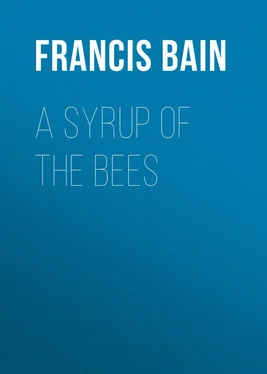Francis Bain - A Syrup of the Bees
Здесь есть возможность читать онлайн «Francis Bain - A Syrup of the Bees» — ознакомительный отрывок электронной книги совершенно бесплатно, а после прочтения отрывка купить полную версию. В некоторых случаях можно слушать аудио, скачать через торрент в формате fb2 и присутствует краткое содержание. ISBN: , Жанр: foreign_antique, foreign_prose, на английском языке. Описание произведения, (предисловие) а так же отзывы посетителей доступны на портале библиотеки ЛибКат.
- Название:A Syrup of the Bees
- Автор:
- Жанр:
- Год:неизвестен
- ISBN:http://www.gutenberg.org/ebooks/35928
- Рейтинг книги:3 / 5. Голосов: 1
-
Избранное:Добавить в избранное
- Отзывы:
-
Ваша оценка:
- 60
- 1
- 2
- 3
- 4
- 5
A Syrup of the Bees: краткое содержание, описание и аннотация
Предлагаем к чтению аннотацию, описание, краткое содержание или предисловие (зависит от того, что написал сам автор книги «A Syrup of the Bees»). Если вы не нашли необходимую информацию о книге — напишите в комментариях, мы постараемся отыскать её.
A Syrup of the Bees — читать онлайн ознакомительный отрывок
Ниже представлен текст книги, разбитый по страницам. Система сохранения места последней прочитанной страницы, позволяет с удобством читать онлайн бесплатно книгу «A Syrup of the Bees», без необходимости каждый раз заново искать на чём Вы остановились. Поставьте закладку, и сможете в любой момент перейти на страницу, на которой закончили чтение.
Интервал:
Закладка:
So as they stood, silent, and listening to the sound of the sea, all at once there came a man who ran towards them. And taking off his turban, he cast it at the great god's feet, and fell on his face himself. And after a while, he looked up, and joined his hands, and said: O thou Enemy of Love, now there is absolutely no help for me but in the sole of thy foot. For when the sun rose this morning, the Queen was found lying drowned, and all broken to pieces, in the sea foam under the palace wall. And when they ran to tell the King, they found him also lying dead, where he sleeps on his palace roof that hangs over the sea, with a dagger in his heart. And the city is all in uproar, for loss to understand it, and Gangádhara the minister has made of me a victim, by reason of an old grudge. And now my head will be the forfeit, unless I can discover the guilty before the rising of another sun. And thou who knowest all things, past, present, or to come, art become my only refuge. Grant me, of thy favour, a boon, and reveal to me the secret, for who but thyself can possibly discover how the King and Queen have come to this extraordinary end.
So as he spoke, gazing as if in desperation at Maheshwara, all at once, as if moved to compassion, that image of the Deity turned from the wall towards him, and nodded at him its stony head: so that in his terror that unhappy mortal nearly left his own body, and fell to the ground in a swoon. And Maheshwara gazed at him intently, as he lay, and put him, by his yoga , 8 8 What we should call, in such a case, mesmerism: the power of concentrated will. There is something in it, after all.
asleep. And the Daughter of the Snow said softly: O Moony-crested, who is this unlucky person, and what is the truth of this whole matter, for I am curious to know? And Maheshwara said slowly: O Snowy One, this is the chief of the night watch of the city; and be under no alarm. For while he sleeps, I will reveal the truth to him, in a magic dream: making him as it were a third person, to overhear our conversation. And I will do the same to the prime minister, so that in the morning, finding their two dreams tally, he will gain credit and save his life. Thereupon Párwatí said again: O Lord of creation, save mine also. For I am as it were dying of curiosity, to hear how all this came about.
So then, after a while, that omniscient Deity said slowly: All this has come about, by reason of a dream. And Gauri said: How could a dream be the cause of death, both to the King and Queen? Then said Maheshwara: Not only is there danger in dreaming, but the greatest. Hast thou not seen thy father's woody sides reflected in the still mirror of his own tarns? And the goddess said: What then? And Maheshwara said: Hast thou not marked how the reflection painted on the water contains beauty, drawn as it were from its depths, greater by far than does the very thing it echoes, of which it is nothing but an exact copy? And Párwatí said: Aye, so it does. Then said Maheshwara: So it is with dreams. For their danger lies in this very beauty, and like pictures upon quiet water, which contains absolutely nothing at all, below, they show men, sleeping, visions of unrealisable beauty, which, being nothing whatever but copies of what they have seen, awake, possess notwithstanding an additional fascination, not to be found in the originals, which fills them with insatiable longing and an utter contempt of all that their waking life contains, as in the present instance: so that they sacrifice all in pursuit of a hollow phantom, trying to achieve impossibility, by bringing mind-begotten dream into the sphere of reality, whither it cannot enter but by ceasing to be dream. But the worst of all is, as in this King's case, when dreaming is intermingled with the reminiscences of a former birth: for then it becomes fatality. And Párwatí said: How is that? Then said Maheshwara: Every soul that is born anew lies buried in oblivion, having utterly forgotten all its previous existence, which has become for it as a thing that has never been. And yet, sometimes, when impressions are very vivid, and memory very strong, here and there an individual soul, steeped as it were in the vat of its own experience, and becoming permanently dyed, as if with indigo, will laugh, so to say, at oblivion, and carry over indelible impressions, from one birth to another, and so live on, haunted by dim recollections that throng his memory like ghosts, and resembling one striving vainly to recall the loveliness and colour of a flower of which he can remember absolutely nothing but the scent, whose lost fragrance hangs about him, goading memory to ineffectual effort, and thus filling him with melancholy which he can never either dispel or understand.
So as he spoke, there came past the temple door a young man of the Shabara caste, resembling a tree for his height, carrying towards the forest a young woman of slender limbs, who was struggling as he held her, and begging to be released; to which he answered only by laughing as he held her tighter, and giving her every now and then a kiss as he went along, so that as they passed by, there fell from her hair a champak flower, which lay on the ground unheeded after they disappeared. And the Daughter of the Mountain exclaimed: See, O Moony-crested, this flower laid as it were at thy feet as a suppliant for her protection: for this is a case for thy interference, to save innocence from evil-doing.
And Maheshwara looked at her with affection in his smile. And he said: Not so, O mountain-born: thou art deceived: since this is a case where interference would be bitterly resented, not only by the robber, but his prey: for notwithstanding all her feigned reluctance, this slender one is inwardly delighted, and desires nothing less than to be taken at her word. For this also is a pair of lovers, who resemble very closely those other lovers, whose story I am just about to tell thee: as indeed all lovers are very much the same. For Love is tyranny, and the essence of the sweetness of its nectar is a despotic authority that is equally delicious to master and to slave. For just as every male lover loves to play the tyrant, so does every woman love to play the slave, so much, that unless her love contains for her the consciousness of slavery, it is less than nothing in her own eyes, and she does not love at all. And know, that as nothing in the world is so hateful to a woman as force, exerted on her by a man she does not love, so nothing fills her with such supreme intoxication as to be masterfully made by her lover to go along the road of her own inclination, since so she gets her way without seeming to consent, and is extricated from the dilemma of deciding between her scruples and her wish. For indecision is the very nature of every woman, and it is a torture to her, to decide, no matter how. And even when she does decide, she does so, generally as a victim, driven by circumstances or desperation, and never as a judge, as in the case of both those women who determined the destiny of this dead King, the one deciding in his favour, precisely because he would allow her no choice, and the other very much against him indeed: and yet both, so to say, without any good reason at all. For women resemble yonder waves of the sea, things compounded of passion and emotion, with impulses for arguments, and agitation for energy, for ever playing, fretting and moaning with laughter and tears of brine and foam: and like feminine incarnations of the instability of water, one and the same essence running through a multitude of contradictory and beautiful qualities and forms: being cold and hard as ice, and soft and white as snow, and still as pools, and crooked as rivers, now floating in heaven like clouds and mists and vapours, and now plunging, like cataracts and waterfalls, into the abyss of hell. Is not the same water bitter as death to the drowning man, and sweeter than a draught of nectar, saving the life of the traveller dying of thirst in the desert sand.
Читать дальшеИнтервал:
Закладка:
Похожие книги на «A Syrup of the Bees»
Представляем Вашему вниманию похожие книги на «A Syrup of the Bees» списком для выбора. Мы отобрали схожую по названию и смыслу литературу в надежде предоставить читателям больше вариантов отыскать новые, интересные, ещё непрочитанные произведения.
Обсуждение, отзывы о книге «A Syrup of the Bees» и просто собственные мнения читателей. Оставьте ваши комментарии, напишите, что Вы думаете о произведении, его смысле или главных героях. Укажите что конкретно понравилось, а что нет, и почему Вы так считаете.












